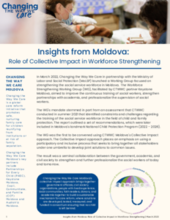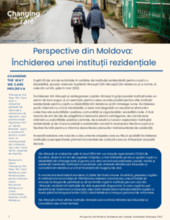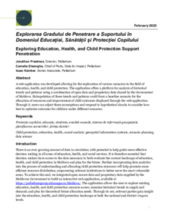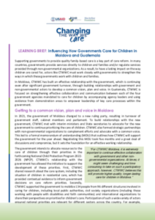This country page features an interactive, icon-based data dashboard providing a national-level overview of the status of children’s care and care reform efforts (a “Country Care Snapshot”), along with a list of resources and organizations in the country.
demographic_data
childrens_living_arrangement
children_living_without_bio
adoption
social_work_force
key_stakeholders
Key Stakeholders
Add New DataOther Relevant Reforms
Add New Datadrivers_of_institutionalisation
Drivers of Institutionaliziation
Add New Datakey_research_and_information
Key Data Sources
Add New DataDevelopment of Integrated Social Care Services for Vulnerable Families and Children at Risk in Moldova
Care Reform Workshop Report
Acknowledgements
Data for this country care snapshot was contributed by partners at Lumos and Changing the Way We Care.
Displaying 51 - 60 of 215
In June 2022, hundreds of care reform leaders gathered to discuss the importance of providing adequate public financing to strengthen families and protect children in Moldova and across the globe. Conference speakers advocated for the provision of a minimum packages of services for families and children.
Olesea, a 24-year old from Moldova with care experience, shares her story of transitioning from a child care institution to foster care.
Alexander is one of many Ukrainian teenagers who fled to Moldova unaccompanied. Thanks to the partnership between border police, child protection specialists working with UNICEF and local authorities, he was identified and integrated into a foster family from Causeni. Since the onset of the conflict, one of UNICEF's biggest priorities has been to protect children from abuse or trafficking.
In March 2022, Changing the Way We Care in partnership with the Ministry of Labor and Social Protection (MoLSP) launched a Working Group focused on strengthening the social service workforce in Moldova.
This learning brief was developed as part of the CTWWC 2021 annual report and shares learning from Kenya and Moldova. It is intended to share what the initiative has learned about gathering data and helping governments and their partners to use it for strategizing care reform.
După 60 de ani de activitate în calitate de instituție rezidențială pentru copii cu dizabilități, Școala-Internat Auxiliară Hîncești (SIA Hîncești) din Moldova și-a închis, în cele din urmă, ușile în mai 2022. Închiderea SIA Hîncești și reint
After 60 years of serving as a residential institution for children with disabilities, the Hîncești Auxiliary Boarding school (SIA Hîncești) in Moldova closed its doors to children in May 2022. The closing of Hîncești SIA serves as a harbinger for what is possible for other institutions for children with disabilities in Moldova and around the world.
This web application was developed to allow for the exploration of various scenarios in the field of education, health, and child protection. The application offers a platform for the analysis of historical trends and patterns using a combination of open data and proprietary data shared by the Government of Moldova.
This learning brief was developed as part of the CTWWC 2021 annual report and shares learning from two demonstration countries, Moldova and Guatemala. It showcases how care reform is led by government and how to influence different government actors.
This learning brief was developed as part of the CTWWC 2022 annual report and shares learning from across different contexts. It is intended to showcase how the transition of care services is happening and how it can be supported.







